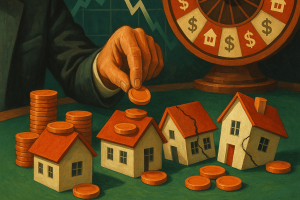How to short the housing market: why experts say it may not always be the best bet

If you’ve seen the 2015 movie “The Big Short,” you might’ve been surprised to learn that the 2008 recession was largely caused by risky financial bets, shady practices, and gambling on a housing market that was ready to burst.
The film breaks down some pretty complicated financial concepts with help from a few unexpected guest stars. Margot Robbie, Anthony Bourdain, Selena Gomez, and economist Richard Thaler pop in to explain things like subprime mortgages and synthetic collateralized debt obligations in a way that actually makes sense.
For a lot of people, it was the first time they really understood what it meant to “short” the housing market. That’s where Michael Burry comes in. He’s the hedge fund manager played by Christian Bale, and he was one of the first to notice something wasn’t right. He even asked for a way to bet against the housing market, which at the time was a pretty radical idea.
Yeah, that was our expression too. #TheBigShort pic.twitter.com/lOJZfaS9vA
— The Big Short Movie (@thebigshort) February 27, 2016
Now, with talk of another housing bubble in the air, some folks are wondering if it’s time to take precautions. But according to most experts, it might be too early to sound the alarm.
Here’s what it means and how to short the housing market:
What does it mean to short the housing market?Shorting the housing market basically means placing a bet that real estate prices are going to drop. It’s a way for investors to protect themselves from losses or even make money if property values start falling.
In 2008, even though there were warning signs everywhere, mortgage lenders kept pushing the idea that real estate was a guaranteed win. Most people believed home prices would just keep going up. But of course, that didn’t happen.
The market crashed. A few savvy investors saw it coming and figured out a way to profit from it. They helped create a credit default swap (CDS) market, which let them bet against mortgage-backed securities tied to housing. In other words, they shorted the market and made a lot of money when it all fell apart.
Normally, short-selling involves borrowing something like a stock from a broker, selling it while the price is high, and then buying it back later if the price drops. The profit comes from the difference. But if the price goes up instead, the losses can pile up quickly.
In the context of housing, though, you can’t directly short a house. Sometimes people confuse it with the term “short-selling a house,” which actually means selling a home for less than what’s owed on the mortgage. That usually happens when a homeowner is in foreclosure.
So when people talk about shorting the housing market, they’re really talking about betting that the real estate market will decline. Since you can’t short houses directly, investors use other tools like real estate investment trusts (REITs) or stocks from companies in the housing industry.
Finding brokers that allow shorting of REITs or housing-related stocks can be tricky, so most of this kind of trading is done using derivatives like CFDs, or contracts for difference, and spread bets. The tools let traders speculate on price movements without actually owning the asset, making it easier to bet against the market.
What is a credit default swap?A credit default swap is kind of like fire insurance on a house, but with a major twist. Imagine someone takes out fire insurance on a house they don’t actually own. If that house catches fire, they still collect the insurance payout. That might sound strange, but that’s basically how a credit default swap works. In this case, the house represents a loan, like a mortgage or a corporate bond. A fire is the loan going bad, meaning the borrower can’t pay it back. The fire insurance is the credit default swap. An investor pays regular fees, like insurance premiums, to another party. In return, that second party promises to pay if the loan fails. Here’s the unusual part. You don’t need to actually own the loan to buy this kind of protection. That means someone can just bet that a loan will fail and collect money if it does. During the 2008 financial crisis, many investors bought credit default swaps on risky loans. When those loans started to default, the investors made huge profits, just like someone collecting fire insurance on a house they didn’t own. When did Michael Burry short the housing market?In 2008, Burry, a well-known figure on Wall Street, noticed a lot of subprime home loans were on the verge of defaulting. Seeing an opportunity, he bet against the housing market by putting over $1 billion of his investors’ money into credit default swaps, which basically let him profit if those loans failed.
He had been anticipating trouble in the housing market since early 2007, predicting that rising interest rates on adjustable-rate mortgages would push many homeowners into default. As the head of Scion Capital, he pushed to create a way to short mortgage-backed securities using these swaps.
This was a big gamble. The banks agreed to the bet, but Burry had to pay large monthly premiums to keep it going, which frustrated a lot of his investors. But he stuck to his research.
When the financial crisis hit in 2008, Burry’s bet paid off in a huge way. His fund skyrocketed in value, jumping 489% and earning a total profit of more than $2.69 billion, even after all those premium payments.
People started calling him an investment oracle. His approach has always been contrarian and deeply rooted in research and value investing, much like the philosophy of Benjamin Graham. He even played a role in the early days of the GameStop stock frenzy in 2021, thanks to his early investment in the company.
BREAKING 
